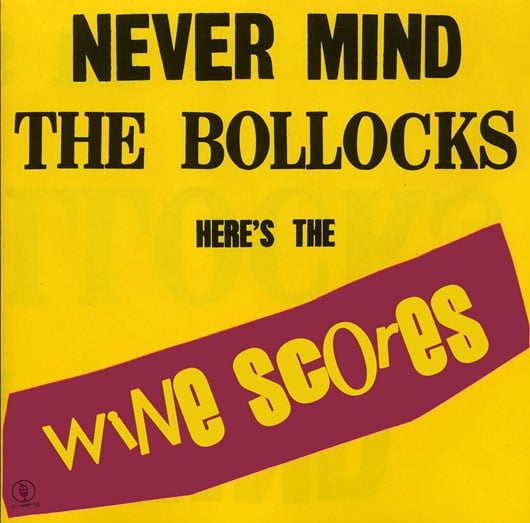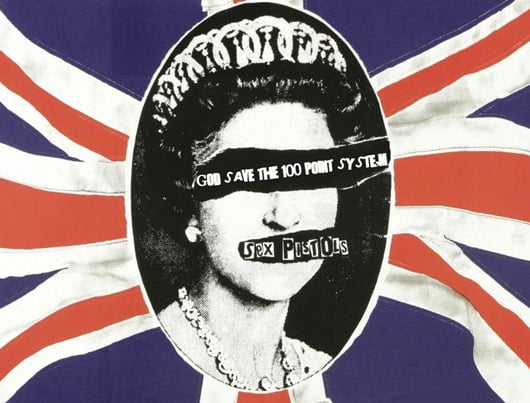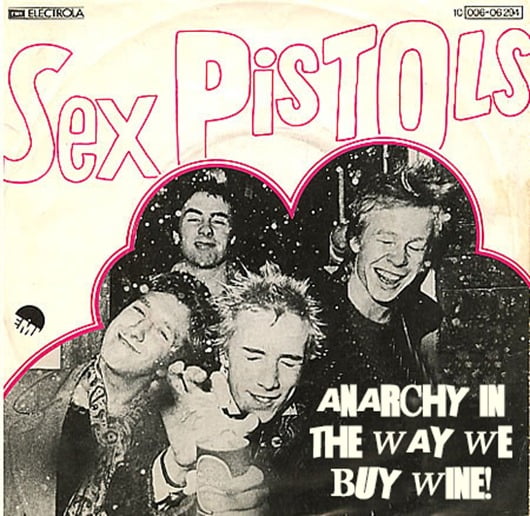Never Mind the Bollocks: Here’s the Wine Scores!
November 25, 2012
Have you ever been walking the wine aisles, and looked at the points a wine has received i.e. 92 out of a 100 from the Wine Spectator, 7 out of 10 from Decanter etc., and wondered how the publication/”wine experts” arrived at that score? I certainly have. But that’s not the point of this post.
Rather than dwelling too much on the criteria used to award a wine its associated points, I’d like to address the overall relevance of wine scores altogether. What I’m going to propose right here, right now, is that wine ratings/scores are for amateurs and they have limited relevance on how you should choose a wine. Obviously I’ve got some explaining to do:
So what’s your deal with wine ratings? Why do you hate them so much?
First and foremost, I’m a wine writer/blogger (I’m still not sure what to call myself). It’s therefore almost a right of passage to take a stand against the “system” (and by ‘system,” I mean the wine point system). Makes it sound so anarchistic!
I don’t hate wine ratings/scores. I think they have a place in the evolution of your wine drinking, but that “place” is right at the beginning of your “wine journey.” At the stage where you need some authority to tell you what to drink, rather than choosing based on past experiences, what you’re serving for dinner and your own knowledge.
Is that it? I thought you’d have something more controversial!
Don’t worry. I’m just getting started…
It’s no secret that wineries change the way they make their wines in order to please the critics, and therefore hope to gain a higher score. In its most basic form: A wine with more fruit, more alcohol, and little more residual sugar will ALWAYS stand out (in one way or another) above a wine with more restrained levels of those same qualities. The reason is that the guys (and girls) doing the tasting will most likely be sampling 100+ wines at one sitting. Once palate-fatigue sets in, the wine which stands out, makes itself memorable and doesn’t deviate too much from what it should taste like (i.e. a Chianti shouldn’t taste like an Australian Shiraz), will be the wine which gets the higher score. Simple!
Of course all of this is a very sweeping statement! I can’t assume how the majority of “point issuers” arrive at the score they do; and as I said, that isn’t the purpose of this post. What I will say is that there should be no argument on whether a great number of wineries are forcing their wines to lose their identity (i.e. a sense of where the wine comes from), simply to try and please the critics.
That’s not cool.
Is that it? I thought you’d have something MORE controversial!
Ok, well dwell on this for a little….
If you think that the ratings/points given by various critics/magazines are NOT influenced by cold-hard cash, you’re out of your mind! Here’s a perfect example of what I’m talking about…
Here in Jacksonville, we have a magazine called Wolio Feekly (I changed the name to protect the identity of magazine). Each year they do a “Best of Jax” issue, awarding everything from Best Smoothie to Best Burger to Best Lawyer to Best Gentleman’s Club, all of which is based on “reader submitted votes.”
Now, what are the chances that maybe the awards for each category might possibly be swayed towards the business who maintains a year-round advertisement in their magazine? I’d say the chances are fairly good, since it’s a free newspaper who depends solely on ads to generate income, and jobs are on the line to maintain the loyalty of its advertisers.
I’m of course not going on record in this post to say that this, or any other publication, would do anything so despicably underhanded…because I can’t afford to be sued right now…but let’s just say that this is a plausible scenario. Do you agree?
Why don’t we relate that same scenario to wine magazines i.e. those who issue points/ratings.
It’s no secret magazine sales have been on a sharp decline over the past few years…something needs to be done to generate revenue…and I’ll leave it at that…
Points obviously have some relevance, because higher points sell wine…right?
Maybe once upon a time that was indeed the case. Not any more though! The number of 90+ point wines littering the “flash sale websites” is PHENOMENAL! Seriously, the quantity of wines with higher than 90 points seems to make up the overwhelming majority of wine flash sale emails I receive each week. Points alone just don’t seem to be doing it for wine buyers anymore! They need a little more substance.
So what happened? Why aren’t points moving cases anymore?
The economy. It’s all to do with the economy. Sometimes scarifies need to be made; and let’s face it, wine isn’t the most ESSENTIAL item in the world. I know, that’s debatable, but you know what I’m saying? “Good wine” can be found at all price points, and what this economy has shown is that wineries can’t mark their wines up based simply on their consistent record of receiving a 90+ rating. The wineries who have done-so have been left with excess inventory, and forced to find other way to move their product (i.e. flash sales websites, selling the juice off to guys like Cameron Hughes).
This by itself should outline the fundamental irrelevance that points and ratings have to the majority of wine drinkers. High points for a wine are not a guarantee of anything.
Are you then saying the 100 point system should be done away with altogether?
Nope! Like I said, it has its place. Some people need to be told what to drink, in the same way that some people also need to read the tasting notes on the back label of the wine bottle to be told what they taste/will potentially taste. I’m not saying it’s right, but some people need it, and it should be part of the learning curve. Of course, choosing a wine based solely on either of these two methods is a misguided long-term method for learning about wine, and it will get you nowhere.
So, in conclusion: You don’t use wine ratings/scores to select the wine you buy, and you advocate that others do the same?
Oh no, I use points all the time, especially when I’m in a hurry at the wine store.
WHAT!?!? You just completely contradicted yourself!!!
I thought you might like that! Seriously though, chew on this all too familiar scenario:
– There are 2 Napa Cabs on the same shelf at the grocery store, right next to each other.
– You haven’t bought either before.
– You can’t taste them.
– You don’t recognize the wineries/producers of either wine.
– They’re at similar price points.
– They’re from the exact same region.
– The shelf-talker standing in front of each respective wine indicates that the Wine Spectator gave one wine 92 points, and the other received 88 points.
Now I ask you: Which wine would YOU choose?
This entry was posted in News and tagged best wine scores, bet wine ratings, Decanter Magazine, Robert Parker, Wine Enthusiast, wine ratings, wine scores, Wine Spectator. Bookmark the permalink. ← Rendez-vous Chardonnay, Clarksburg, California. Spinach and Pepperjack Stuffed Chicken Paired with Robert Mondavi Napa Chardonnay. →











